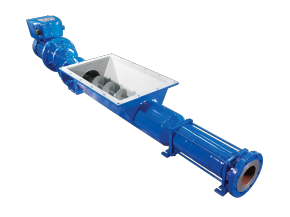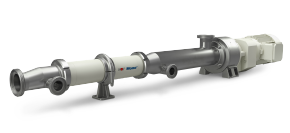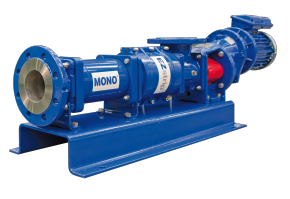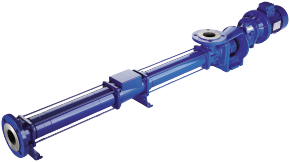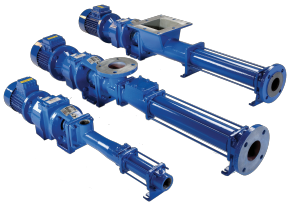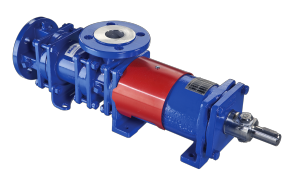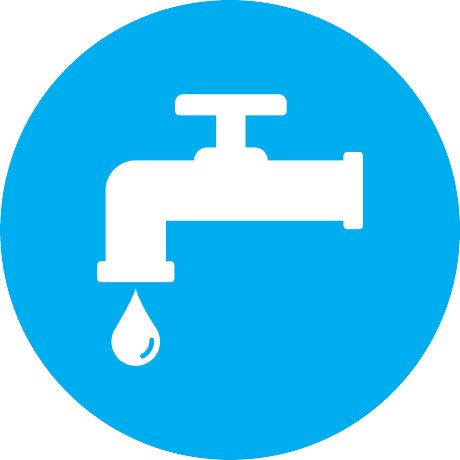Progressive cavity pumps are a type of positive displacement pump with a spiral helical rotor. These pumps create a constant, low pulsation flow and can handle high viscosity and temperature sensitive materials with low shearing and little to no pulse. They are economical, require minimum maintenance, and can be used for both precise dosing and pumping fluid over longer distances. Thanks to their low shear and low pulsation, they are ideal for handling fluids with solids or fluids that need to be handled gently. AxFlow provides pumps and support for a wide range of industries and applications.



Progressive Cavity Pumps
6 series from 1 manufacturers
-
- Acetate
- Adhesives
- Bakery and confectionery
- Beauty & Personal Care
- Brewing and beverages
- Building Services
- Ceramics
- Chemical
- Clay
- Confectionery
- Convenience food
- Dairy
- Detergents
- Dye & Pigment
- Food & Beverage
- Meat Processing
- Mining
- Oil Fats & Mayonnaise
- Paper Mills
- Pharmaceutical
- Research & Development
- Wastewater
- Water Treatment
-
- Booster
- Circulation
- Cleaning
- Control
- Conveying
- Cooling
- Descaling
- Desinfection
- Dewatering
- Discharge
- Distribution
- Dosing
- Drain
- Drainage
- Dredging
- Feed
- Filling
- Filtration
- Flow Control
- Handling
- High-Pressure
- High-Volume
- Injection
- Irrigation
- Level Control
- Lift
- Lifting
- Loading
- Low-Pressure
- Lubrication
- Medium-Pressure
- Metering
- Mixing
- Off-loading
- Pressurisation
- Process
- Processing
- Recirculation
- Recovery
- Refueling
- Replacement
- Spraying
- Transfer
- Treatment
- Unloading
- Volumetric Dispensing
- Washing
-
- Abrasive Liquids
- Acetate
- Acids
- Adhesives
- Alcohols
- Aluminium Oxide Slurry
- Ammonia
- Beer
- Biological Broths and Slurries
- Bitumen
- Carbon Fibers
- Caustic Solutions
- Cereals
- China Clay Slurry
- Chocolate
- CIP Fluids
- Clay
- Coffee
- Concrete
- Cooling Water
- Corrosive Dyes
- Corrosive Liquids
- Cryogenic Liquids
- Crystalline Slurry
- Dairy Products
- Detergents
- Diesel Fuel Oil
- Drinking Water
- Dye Pigment
- Emulsions
- Ethylene Glycol
- Fertilizers
- Foam Protein
- Fruit and Vegetables
- Fruit Concentrates
- Gels
- Glycol
- High Viscosity Liquids
- HydrochloricAcid
- Hygienic Liquids
- Irrigation Water
- Lake Water
- Latex
- Light Fluids
- Lime
- Low NPSH
- Low Viscosity Liquids
- LPG
- Meat
- Milk
- Molasses and Syrups
- Must
- Non-Newtonian Fluids
- Oil, Fats and Mayonnaise
- Paints
- Paints Resins
- Personal Care Products
- Pet Food
- Phosphoric Acid
- Plastic
- Process Condensate
- Produced Water
- Radio Active Fluids
- Redox
- Refrigerants
- Rubber
- Sauces
- Seawater
- Sensitive and Viscous Fluids
- Separated Oil Processing
- Sewage
- Silver Nitrate
- Soaps and Detergents
- Solids and Abrasives
- Spirits
- Sulphuric Acids
- Surface Water
- Surfactants
- Synthetic Fibers
- Thermal Oil
- Thin Liquids
- Thixotropic Fluids
- Toxic Liquids
- Vegetable Oils
- Vinegar
- Viscose
- Viscous Liquids
- Wastewater
- Water
- Water Hardness
- Wine
- Wort
-
- Abrasion Resistant
- Adjustable-Flow
- Automatic
- Booster Sets
- Chemically Resistant
- CIP
- Close-Coupled
- Compact
- Containment
- Corrosion-Proof
- Direct-Drive
- Electric
- Explosion-Proof
- Fish Friendly
- Flange
- Heavy-Duty
- High System Pressure
- High-Efficiency
- High-Flow
- High-Performance
- Horizontal Mount
- In-Line
- Intrinsically Safe
- Low Shear
- Low-Noise
- Mechanical
- Mechanical Seal
- Mixed Flow
- Mobile
- Multi-Stage
- Oil-Free
- Pulse-less
- Rotary
- Rugged
- Sanitary
- Self-priming
- Semi Submersible
- Single-Stage
- Solids Handling
- Variable Speed
- Vertical
- Vertical-Mount
How do progressive cavity pumps work?
Progressive cavity pumps, also known as PC pumps, eccentric screw pumps and helical rotor pumps, are a type of positive displacement pump. A spiral helical rotor similar to a corkscrew sit within the stator and as it rotates cavities are formed through which the fluid moves. The cavities have a specific volume that decides the volumetric flow rate of the pump and is directly proportional to the rotational speed of the rotor, resulting in a low amount of shearing and little to no pulse. The size of the pump and the fluid being pumped usually determines the rotational speed of the pump. Larger pumps tend to run at lower RPMs while smaller pumps tend to run at higher RPMs. With a gearbox or rubber v-belts between the pump and motor the speed of the pump can be controlled.

Advantages of progressive cavity pumps
Economical: Progressive cavity pumps are often more efficient in the long run as they require minimum maintenance. Other pump types that provide a faster flow rate may encounter maintenance concerns in applications with high viscosity or temperature sensitive materials. If or when maintenance is needed for progressive cavity pumps, it can usually be performed on-site.
Flow: PC pumps both create a constant flow and a smooth, low pulsation, flow. The gentle pumping action combined with large continuous cavities ensures low shear. This allows suspended solids to be handled with ease, resulting in delicate solids or fluids not being damaged in the process. Thanks to the constant and low pulsation flow, the pump type can also be used for precise dosing.
Pressure: PC pumps can both achieve and handle high pressure, making the pumps efficient at pumping fluid over longer distances, thus eliminating the need for multiple pumps.
Running speed: As the speed of the pump can be controlled, regulating flow is simple. As the pump can be run at low speeds, it is particularly suitable for abrasive applications.
Difficult fluids handling: Progressive cavity pumps may sometimes be overlooked as they are typically more efficient when operating at lower speeds. However, viscous, abrasive, and temperature-sensitive materials can cause problems in other pump types with higher flow rates. Thanks to the low internal speed and high-pressure capabilities of progressive cavity pumps, they can handle difficult fluids such as viscous and abrasive fluids resulting in less wear and tear from fluid particles.
The downsides of progressive cavity pumps are that they cannot be dry-run or pump against a closed discharge as this would likely damage the pump.
Applications
Progressive cavity pumps are especially suited when a fluid needs to be handled gently, contain solids, and/or have high viscosity.
Other areas and industries where progressive cavity pumps are well suited include:
- Metering and dosing where accuracy is required.
- Hygienic environments and/or shear sensitive fluids such as in the food, drink and cosmetics industry.
- Industrial operations containing abrasive particles such as wastewater management and pumping sewage, sludge or slurry.
- Pumping heavy or viscous fluids such as oil and chemicals.
- Applications that require varied flow rates.
Important considerations when selecting the right pump
Progressing cavity pumps differ fundamentally from one another depending on the industrial application. The components are available in different materials and designs to best suit the specific application or fluid requirements.
The three key considerations when selecting a progressive cavity pump are:
Viscosity: The more viscous a fluid is, the lower the operating speed of the pump should be. The efficiency of progressive cavity pumps is highest at slower speeds. In order to maximise resistance to wear, it is ideal to select a design which keeps the linear fluid velocity at less than seven feet per second. However, solids can fall out of suspension at velocities less than four feet per second.
Temperature: Stator material must correlate with the fluid temperature. The size of the pump is also key as increases in fluid temperature will result in the expansion of the elastomer stator. Another important consideration is the application and fluid have significant temperature variations, progressing cavity pumps is often not the most suitable solution.
Abrasiveness: The higher the abrasive properties of the fluid the better to select a larger pump and run it at slower speeds rather than selecting a smaller, faster, pump. This may seem more expensive, but it is likely to improve the return on investment and in the long-term reduce maintenance costs. It is recommended that the pressure per stage be lowered if abrasive fluids are to be pumped.
Why buy progressive cavity pumps from AxFlow
AxFlow offers progressive cavity pumps and accessories for the widest range of industries and applications. Do you need support in selecting the right pump for your needs? Do not hesitate to get in touch. AxFlow’s experts and engineers can provide guidance for selecting, specifying, installing and maintaining your progressive cavity pump.
